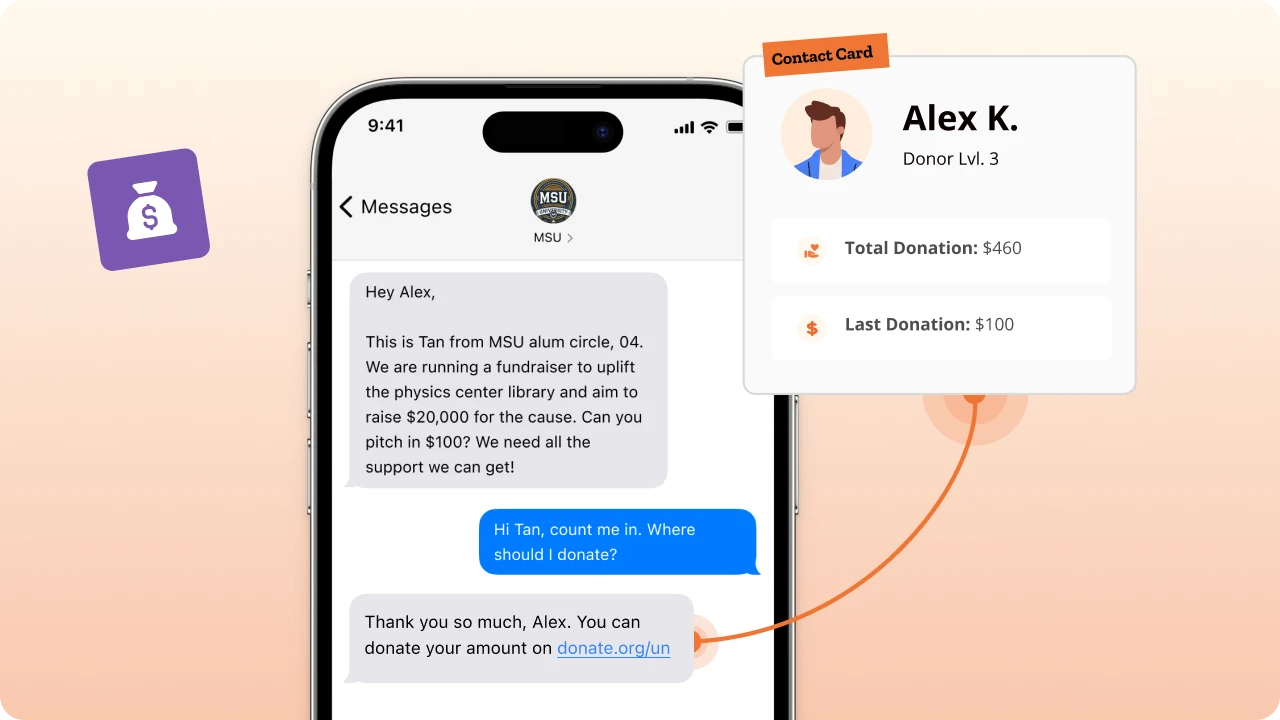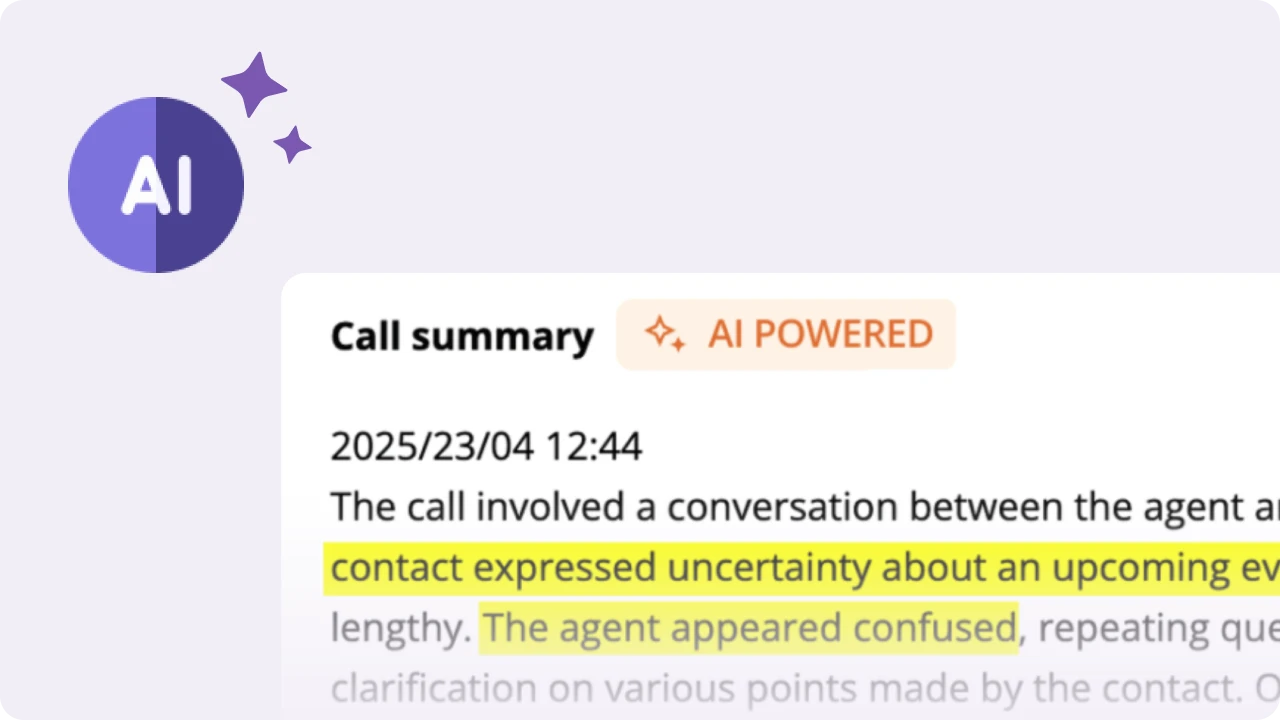Table of Contents
A strong volunteer call script can make or break your phonebanking efforts. This is especially true in a phonebanking setup, because calls connect quickly, and agents have just seconds to make a great first impression. In fact, most volunteers using dialers in campaigns spend nearly 57 minutes on talk time, with just 5% of idle time.
In this high-speed environment, your script makes all the difference. In this blog, we’ll show you how to improve your phonebanking script.
Why does your volunteer call script matter more than you think?
It takes just 7 seconds to make a first impression! That’s how quickly someone decides whether to listen or hang up. When phonebanking, every second is precious, and a weak campaign call script can mean wasted calls, frustrated volunteers, and missed chances to connect.

Think of your script as your campaign’s handshake—the first impression sets the whole conversation in motion.
A strong script will:
- Sets the tone for the conversation
- Builds trust and credibility quickly
- Increases the likelihood of meaningful engagement
- Boosts volunteer confidence and reduces anxiety
Best practices for creating a volunteer call script
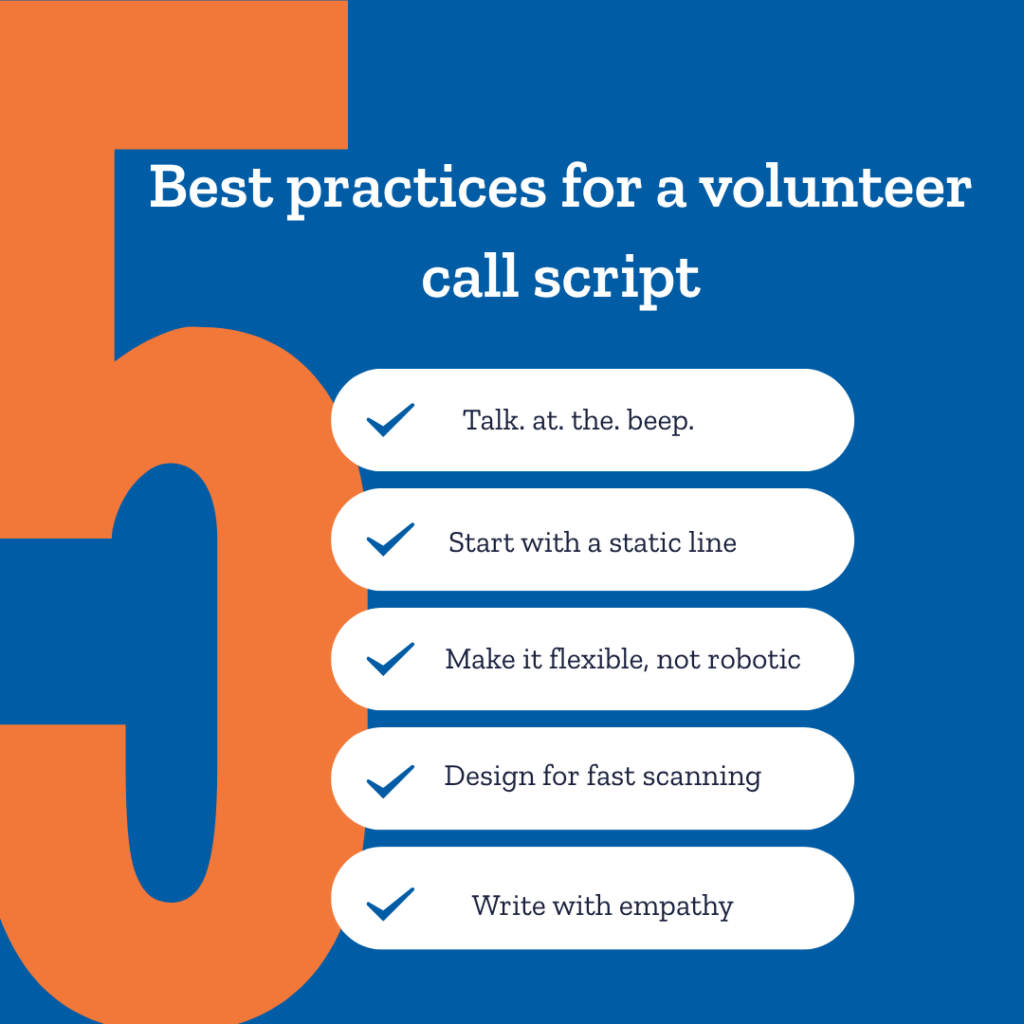
1. Talk. at. the. beep.
Predictive dialers transfer the call only after detecting a human voice. That detection, decision, and transfer takes about 600 milliseconds to 1.4 seconds.
By the time the call hits your screen, chances are—the person has already said “Hello?”
If you wait for them to repeat it, you risk falling into what we call the hello death spiral:
“Hello?… Hello? Are you there?… Wait, can you hear me?… Never mind.”
Avoid it. Instead, speak confidently and immediately at the beep.
Here’s what you should do:
- Start speaking as soon as you hear the beep and the contact’s info appears. Don’t wait.
- Use a practiced, static volunteer call script line
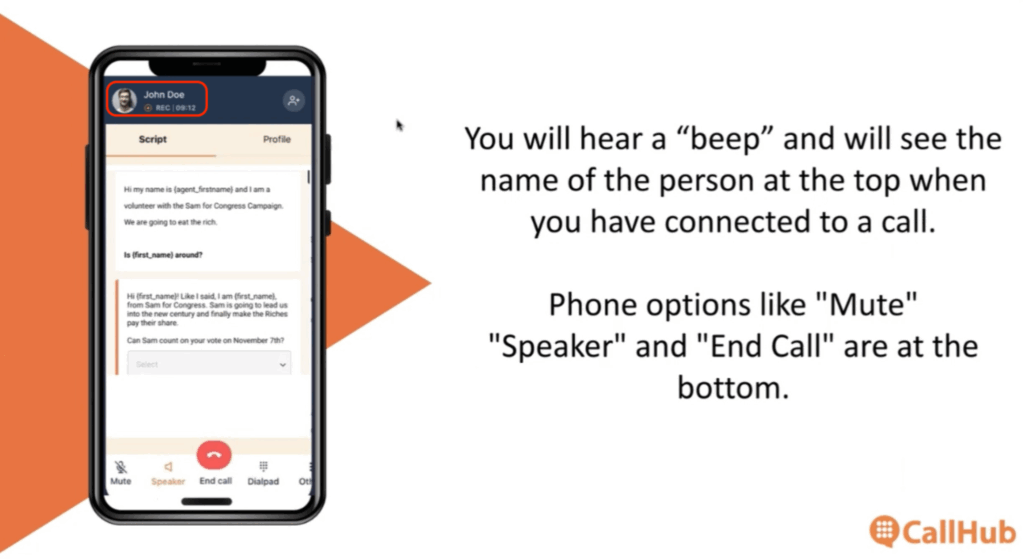
At CallHub, after the beep, you’ll see the contact’s details on the top left of your screen. On mobile, you can swipe right to view their full profile.
Read Also: Fundraising Script: Samples For Donors, Events & Campaigns
2. Start with a static line—every time
Now that you know to start talking right after the beep, what should you say?
Begin every call with a simple, consistent opener you can always use, no matter who picks up the call—something like:
“Hi, my name is Sam, I’m calling from Reform…”
You only get seconds to ground the conversation. Don’t wait to read the contact’s name first—start with what’s more reliable: your name, organization, and purpose. Use this format:
“Hi, my name is [Your Name]. I’m calling from [Organization]. I’m reaching out to talk to you about [Brief Purpose].”
Here’s why this works:
- It fills any awkward silence right at the start.
- It helps build your confidence and keeps the call moving smoothly.
- It allows you to scan the rest of your volunteer call script or look up contact details.
| Pro tip: Use a headset for better audio quality—most come with built-in noise cancellation and ensure your voice comes through clearly. If possible, make calls from a quiet space to minimize background. |
Read Also: 3 Unique Fundraising Board Script For Calling Board Members
3. Make it flexible, not robotic
Predictive dialing moves fast, but people don’t.
With 68% of people saying that a pleasant interaction shapes their experience, it’s crucial to train your agents to adapt in real time. When a contact leans in, your volunteers should be ready to listen, respond, and guide—not read line-by-line.
There are two types of phonebanking scripts—static and branching. While static scripts offer a fixed flow, branching scripts let volunteers adapt based on the conversation. A great phonebanking script lets volunteers branch naturally based on the conversation, such as:
- Supporter who wants to help → Guide them to a volunteer signup page
- Needs more information → Provide quick facts or resources, or offer to follow up.
- Skeptical but polite → Acknowledge their hesitation with empathy
Use optional probes, soft pivots & dialogue space to turn volunteer call scripts into real conversations. Here are some examples of how these can be used:
| Tactic | Purpose | Example |
|---|---|---|
| Optional probe | Add optional follow-up questions in the volunteer call script that callers can use when needed | “Have you heard about our campaign before?” |
| Soft pivot | Train volunteers to gently address concerns or redirect without pushing the volunteer call script | “I understand — it’s a common concern. Can I share some information?” |
| Dialogue space | Leave room for callers to listen and respond naturally | “What matters most to you about this issue?” |
Read Also: 5 Tools and Tips for Keeping Event Volunteers Organized
4. Design for fast scanning
Volunteers don’t read—they scan. If your volunteer call script looks like a wall of text, they’ll miss key details or fall into robotic reading mode. That means lower engagement and fewer real conversations.
Make your campaign call script easy to navigate at a glance:
- Bold key phrases: Highlight the main ask/ instructions.
- Use branching scripts: Break content into questions to make the flow easy to get information from people.
- Make action buttons/fields stand out: Especially in dynamic scripts, ensure that buttons (like “Save and Next” or “Next”) are visually distinct.
CallHub’s ‘Branching scripts’ lets you easily set up dynamic call scripts—even for complex or lengthy conversations with logic. It guides agents or volunteers step-by-step, showing only the relevant questions and responses based on each contact’s replies—no more endless scrolling or awkward pauses.
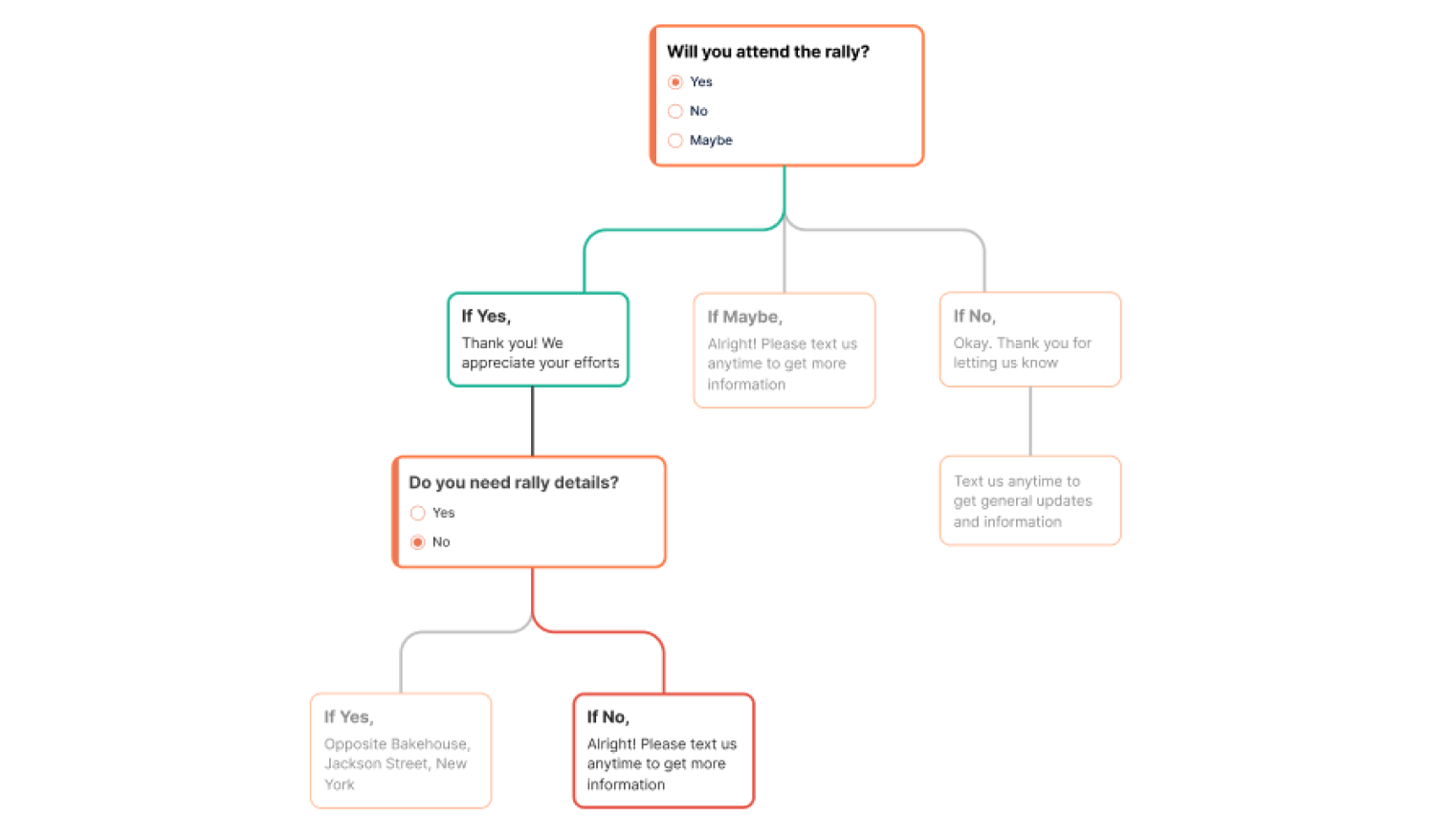
Below, you can see how the word “ Fundraising Gala” is highlighted, plus you also know how the ‘NEXT ’ button stands out easily on your phone with CallHub.
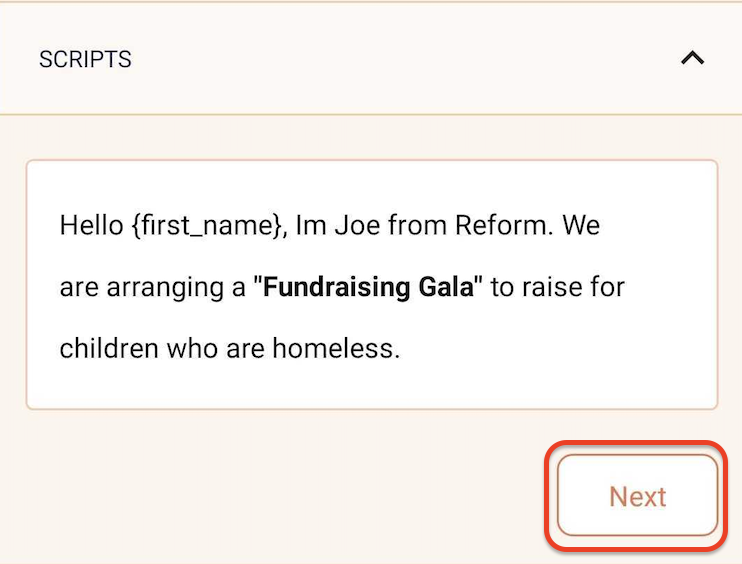
5. Write with empathy
54% of people believe empathy is key in phone interactions. Your volunteer call script should feel like a genuine conversation, not a sales pitch. The goal is to connect warmly, respectfully, and authentically with every person you call. Here’s how to do that:
- Use real, relatable language: Phonebanking scripts are guides, not cages. If someone shares a personal story or concern, acknowledge it before moving on. For example:
- “That sounds tough. Thank you for sharing that with me.”
- “I hear you, and many people have had similar questions. Can I share what we’ve learned?”
- Build dialogue with open-ended questions: Rather than jumping to the next scripted line, ask open-ended questions that invite the contact to share their views or concerns, like:
- “What’s most important to you about this issue?”
- “I hear you. Can I tell you what others have found helpful?”
- Let volunteers be themselves: Encourage them to speak with their own voice. This creates space for genuine connection—even if it means a longer conversation now and then.
- Use empathy statements throughout the call: Empathy isn’t just for the opening or when someone is upset. Use it throughout the call.
- “I completely understand where you’re coming from.”
- “That’s a great question, and I’m glad you brought it up.”
- “Thanks for letting me know how you feel about this.
| Here are some test lines you can use in your scripts |
|---|
|
See how to set up scripts on CallHub:
Bonus tips for the perfect volunteer call script
Want to make your volunteer calls more effective instantly? Here are five quick script fixes that boost performance:
| # | What to fix | Why it matters | Try instead |
|---|---|---|---|
| 1 | Avoid “Is this [Name]?” | Sounds robotic and can make people defensive. | “Can I speak to [Name]?” — more natural & polite |
| 2 | Open with a purpose | People want to know why you’re calling—right away. | “I’m calling to invite you…” |
| 3 | Build micro-commitments | Small “yeses” increase engagement and attention. | “Can I share something important?” |
| 4 | Use [Name] after confirmation | Personalization builds trust and improves focus | Use their name naturally once they confirm it. |
| 5 | End every call with a thank-you | Gratitude leaves a positive impression, even if they say no. | “Thank you so much for your time today.” |
Read Also: The Most Effective Volunteer Recruitment Methods
FAQs on volunteer call scripts
How do I start a volunteer phone call?
Begin with a confident, consistent static line: your name, organization, and reason for calling.
What makes a good campaign call script?
A good script is clear, conversational, flexible, and designed for real human connection.
How do I structure a predictive dialer script?
Use static openers, bold key actions, and branching paths that adapt to responses.
How can I improve call script engagement?
Write with empathy, build in dialogue, and train volunteers to listen, not just read.
Final takeaway
Effective volunteer call scripts are more than just words—they’re tools for authentic connection. By making your scripts skimmable, conversational, and empathetic, you empower volunteers to build trust and drive action on every call.
Ready to turn these insights into a full script?
Check out our guide on how to write your phonebanking script (with samples) and start implementing the steps we’ve covered above.

